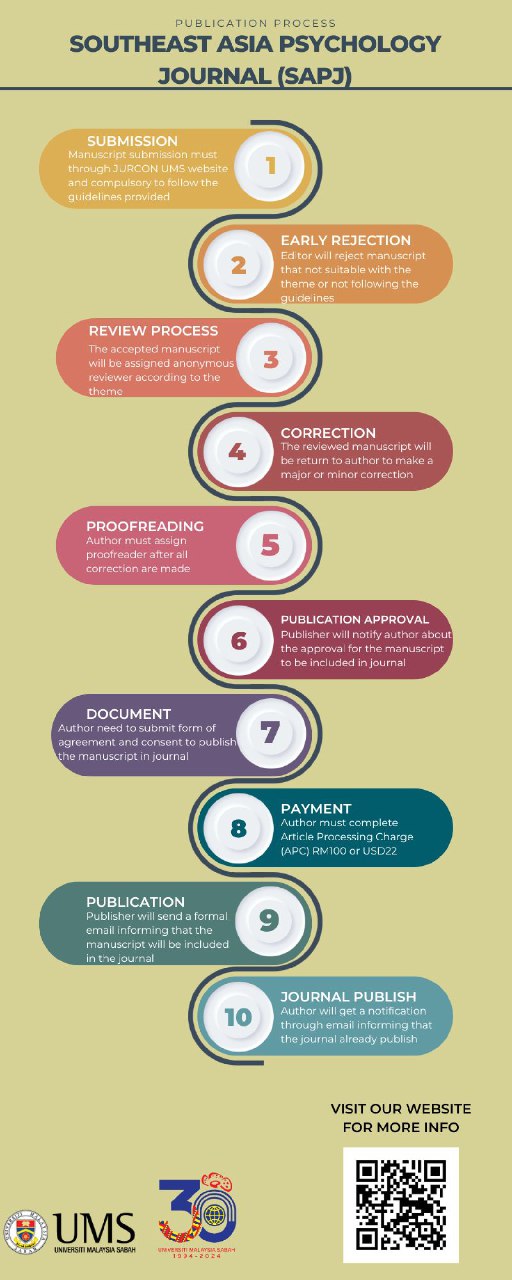RESILIENCE: DOES FATHER’S ATTACHMENT MATTER?
DOI:
https://doi.org/10.51200/sapj.v9i1.5038Keywords:
Father's Attachment, Resilience, College StudentAbstract
This study aims to determine the effect of father’s attachment on the resilience of 102 psychology faculty students who are working on their final assignments at X University, Jakarta. This study uses a quantitative approach, and the technique used for sampling is Non-Probability Sampling. While, the Inventory Parents and Peer Attachment (IPPA) by Armsden and Greenberg (2009) was used to measure student's attachment to father, and Resilience Quotient (RQ) by Reivich & Shatte (2002) to measure student resilience. Data were processed through a simple regression test to see the effect of father attachment on the resilience of students who were doing their final project in the Faculty of Psychology of X University, Jakarta. The statistical result obtained in this study is a correlation coefficient of r = 0.238 * r2 = 0.057 (5.7%) with sig. (p) = 0.016. These indicates that there is an influence of the father's attachment variable (X) on the resilience variable (Y). The magnitude of the correlation r = 0.238* indicates a positive or unidirectional relationship between the father's attachment and resilience. This means the closer the relationship the child has with the father, the greater the ability or resistance of the child to adapt to every condition and overcome any problems and difficulties that he or she faces.
References
Academic Bureau X University Jakarta .(2020). [Angka Efisiensi Edukasi TA 2019/2020] . Unpublished raw data.
Arisandi, A, Dawanti, R & Risnawati, E. (2019). Role of Religiosity and Psychological Well-Being to Resilience on Victim of Domestic Violence. Mindset, 10(2), 67-77
Aryo, W. B. (2020, April 29). Membangun SDM Indonesia Membangun Sinergitas. Diunduh pada 25 Desember 2020, dari https://www.kemenkopmk.go.id/membangun-sdm-indonesia-membangun-sinergitas#:~:text=Pengembangan%20Sumber%20Daya%20Manusia%20(SDM,tujuan%20dalam%20pembangunan%20nasional%20Indonesia.&text=Atas%20dasar%20itu%2C%20untuk%20mencapai,dengan%20kualitas%20sumber%20daya%20manusia.
Atwool, N. (2006). Attachment and Resilience: Implications for Children in Care. Childcare in Practice. 12(4), 315-330.
Aulia, S., & Panjaitan, R. U. (2019). Kesejahteraan Psikologis dan Tingkat Stres Pada Mahasiswa Tingkat Akhir. Jurnal Keperawatan Jiwa, 7(2), 127-134
Bayani, I., & Ekasari, A. (2009). Attachment pada Ayah dan Penerimaan Peer-Group dengan Resiliensi: Studi Kasus pada Siswa Laki-laki di Tingkat Sekolah Menengah Pertama. Jurnal Soul.,2(2) 34-61.
Bifulco, A. (2018). Identity, Attachment, and Resilience Exploring Three Generations of a Polish Family. New York: Routledge.
Cenceng, (2015). Perilaku Kelekatan pada Anak Usia Dini (Perspektif John Bowlby). Lentera, 9(2), 141-153
Dearly & Syaiful, I. A. (2015). Design Program to Improve the Resilience Potential of a Drug addict (Study of Qualitative Based on Action Research). Jurnal Intervensi Psikologi, 7(1), 116-129.
Flouri, E. (2005). Fathering and child outcomes. John Wiley & Sons Ltd. https://doi.org/10.1002/9780470713228
Freire C, Ferradás M. M., Valle A, Núñez J. C., & Vallejo, G. (2016). Profiles of Psychological Well-being and Coping Strategies among University Students. Front. Psychol, 7, 1554
Gunawati, R., Hartat, S., & Listiara, A. (2006). Hubungan Antara Efektivitas Komunikasi Mahasiswa-Dosen Pembimbing Utama Skripsi dengan Stres dalam Menyusun Skripsi pada Mahasiswa Program Studi Psikologi Fakultas Kedokteran Universitas Diponegoro. Jurnal Psikologi Universitas Diponegoro. Vol.3 No.2, Desember 2006.
Hapunda, G., Mahama, S., Mesurado., Verma, S. K., & Koller, S. (2019). Cultural variability and consistency in adolescents’ emotional regulation and relationship with their parents: data from Argentina, Ghana, India and Zambia. International Journal of Adolescence and Youth, 24(3), 333-350, DOI: 10.1080/02673843.2018.1544083
Ingrida, G N. (2018). “Hubungan Resiliensi dengan Perilaku Agresi Penumpang Gerbong Khusus Wanita Commuter Line”. Skripsi. Fakultas Psikologi. Universitas Mercu Buana. Jakarta.
Armsden, G., & Greenberg, M. T. (2009). Inventory of parent and peer attachment (IPPA). Pennsylvania, USA: Penn State University, College of Health and Human Development.
Kail, Robert V., & John C. Cavanaugh. (2010). Human Development: A Life Span View. Wadsworth Cengage Learning: Boston.
Kamza, A. (2019). Attachment to mothers and fathers during middle childhood: an evidence from Polish Sample. BMC Psychology,7 (79), 1-18. doi:10.1186/s40359-019-0361-5.
Krisdianto, M. A., & Mulyanti. (2015). Mekanisme Koping Berhubungan dengan Tingkat Depresi pada Mahasiswa Tingkat Akhir. Jurnal Ners dan Kebidanan Indonesia 2(3), 71-76.
Marriner, P., Cacioli, J-P., & Moore, K. A. (2014). The Relationship of Attachment to Resilience and their Impact on Stress. In K. Kaniasty, K.A. Moore, S. Howard & P. Buchwald (Eds). (pp. 73-82). Stress and Anxiety: Applications to Social and Environmental Threats, Psychological Well-Being, Occupational Challenges, and Developmental Psychology. Berlin: Logos Publishers.
Mc Cartney, K., & Dearing, E. (2002). Child development. USA. Mc Millan Refference.
Nanie, T. F. D. (2014). “Hubungan Antara Attachment Terhadap Orangtua dengan Resiliensi pada Mahasiswa Tahun Pertama Angkatan 2013 Fakultas Psikologi UKSW yang berasal dari Luar Pulau Jawa:. Skripsi. Fakultas Psikologi. Universitas Kristen Satya Wacana. Salatiga.
Purnama, R. A. & Wahyuni, S. (2017). Kelekatan (Attachment) pada Ibu dan Ayah dengan Kompetensi Sosial pada Remaja. Jurnal Psikologi, 13(1), 30-40
Purwanti, D. A., & Kustanti, E. R. (2018). Hubungan Antara Resiliensi Dengan Psychological Well-Being Pada Ibu Yang Memiliki Anak Dengan Gangguan Autis. Jurnal Empati, 7(1), 283-287
Rozaq, A. (2014). “Tingkat Stres Mahasiswa dalam Proses Mengerjakan Skripsi”. Skripsi. Fakultas Dakwah dan Ilmu Komunikasi. Universitas Islam Negeri Sunan Ampel Surabaya. Surabaya.
Sary, Y N E. (2015). Psikologi Pendidikan Untuk Mahasiswa Umum dan Kesehatan. Yogyakarta: Parama Publishing.
Schofield, G. & Beek, M. (2014). THE SECURE BASE MODEL Promoting Attachment and Resilience in Foster Care and Adoption. London: BAAF
Fitria, N. & Septiani, T., (2016). Hubungan antara Resiliensi dengan Stres pada Mahasiswa sekolah Tinggi Kedinasan. Jurnal Penelitian Psikologi (07)2, 59-76.
Sholihah, I, & Zulfa, F. E. (2019). Peningkatan Kualitas Sumber daya Manusia Melalui Pendidikan. Jurnal Al-Hikmah (7), 33-46
Sofiachudairi, & Setyawan, I. (2018). Hubungan antara Self-Compassion dengan Resiliensi pada Mahasiswa yang Sedang Mengerjakan Skripsi di Fakultas Psikologi Universitas Diponegoro. Jurnal Empati,7(1), 54-59
Sulejmanovic, D. (2017). Why Father is So Important: The Role of The Attachment with The Father In The Development of Prosocial Behavior. JMSS, 3(1), 33-38.
Tatan, Z. M. (2011). Analisis Prokrastinasi Tugas Akhir/Skripsi. Jurnal Formatif, 2(1), 82-89.
Tertinggi sejak 1997 jumlah mahasiswa Indonesia 2018 capai 7-juta (2019, September 26). Diunduh pada 25 Desember 2020, dari https://databoks.katadata.co.id/datapublish/2019/09/26/tertinggi-sejak-1997-jumlah-mahasiswa-indonesia-2018-capai-7-juta- jiwa#:~:text=Jumlah%20mahasiswa%20pada%202018%20tumbuh,sebanyak%202%2C8%20juta%20jiwa.
Triyana, M. (2015). “Hubungan antara Resiliensi dan Stres dalam Menyusun Skripsi pada Mahasiswa Program Studi Psikologi Fakultas Kedokteran Universitas Sebelas Maret”. Skripsi. Fakultas Kedokteran. Universitas Sebelas Maret. Surakarta.
Widuri, E L. (2012). Regulasi Emosi dan Resiliensi pada Mahasiswa Tahun Pertama. Jurnal Humanitas, 9(2), 147-156.
Yu, X., & Zhang, J. (2007). Factor Analysis and Psychometric Evaluation of The Connor-Davidson Resilience Scale (CD-RISC) with Chinese People. Journal of Social Behavior and Personality, 35(1), 19-30.







